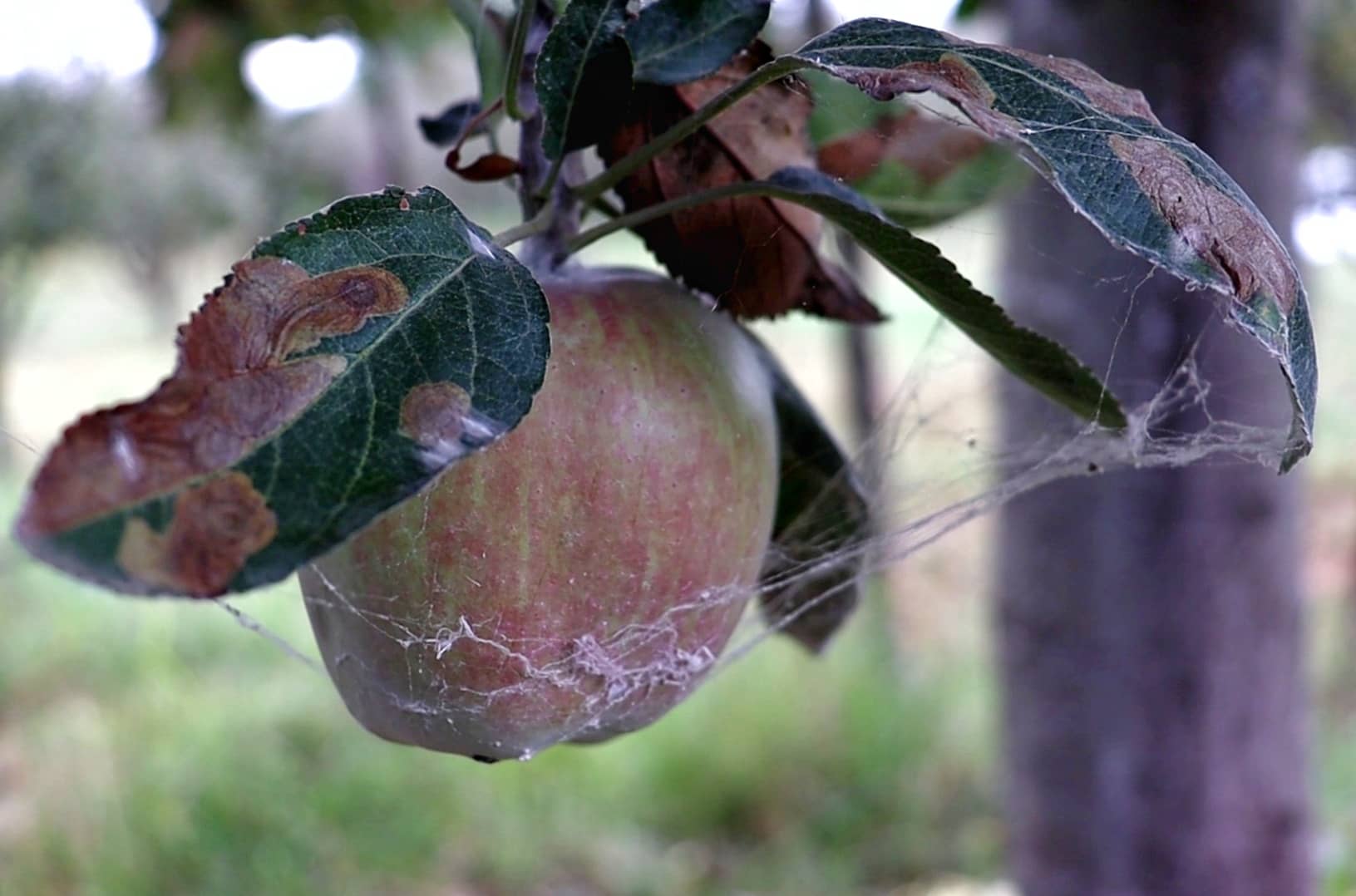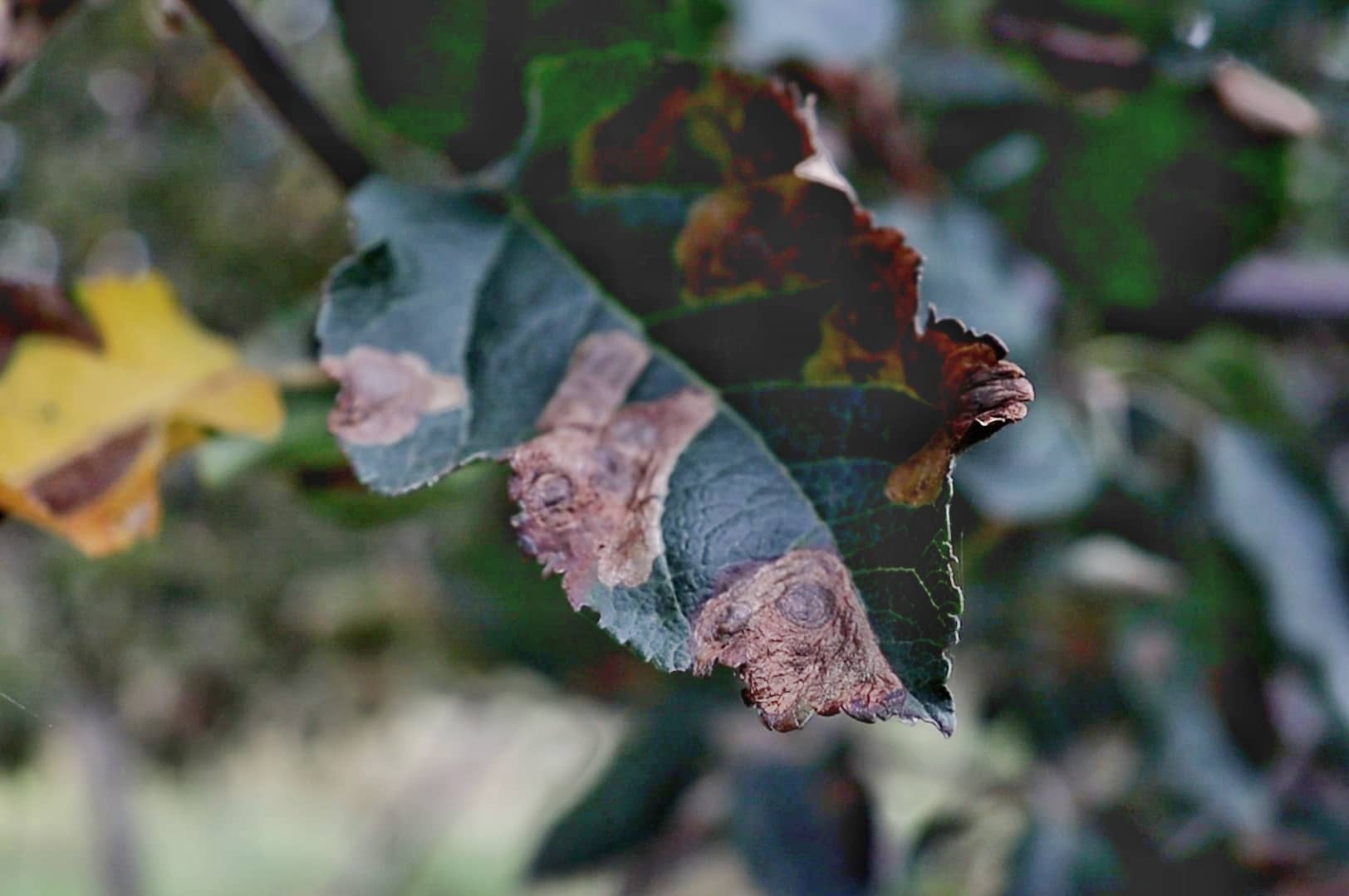Emergent Apple Pest From ‘Imported Rootstock’ Wreaking Havoc in Orchards of South Kashmir

Muhammad Abbas is a freelance journalist based in Kashmir.
The Government denies that it is a new infection. It advised the orchardists to follow the departmental guidelines to stop and eradicate this insect.
SHOPIAN — Asif Ahmad Lone, an apple farmer from Reshipora in the southern Shopian district, did not notice a cocoon-like web on his apple trees. However, he did take note of the abrasion when it turned into a spider-like web—with lesions becoming more definite—but did not suspect his orchard to be under a far-reaching infection till it spread widely.
Lone had spotted the pests in July and sprayed the insecticides thrice, but the pests did not go away. Instead, it damaged the leaves and fruit. Lone, whose 16 Kanal land is affected by the pest, said, “Whole of our economy, livelihood is dependent on apple farming and this deadly insect has ruined us of the apple crop.”
The ‘unidentified’ pest has been found in apple orchards mostly in the Zainapora area of south Kashmir’s Shopian district. Experts believe that this newly found insect is a new introduction, and was brought through the import of high-density apple rootstock.
The orchardists said that within a fortnight, this cocoon-like insect multiplied from a few to millions and continues to spread to more areas like wildfire.
Orchardists told Mountain Ink that the affected areas are situated around Asia’s largest apple farm, Zainapora, where every year tens of thousands of trees are imported from different countries and distributed among the orchardists across Kashmir.
Support Our Journalism
You are reading this because you value quality and serious journalism.
But, serious journalism needs serious support. We need readers like you to support us and pay for making quality and independent journalism more vibrant.
The pest, orchardists said, which looks like a cocoon has spread a white, spider-like web from one branch to another. It also makes a web all around the apples, trunks of trees and even wounds the apple.

Ghulam Hassan, an orchardist from Reshipora, said that they are very much sure that this insect was brought with high-density apple plants.
“We have not seen this insect ever before. It spread all over the area within a few days and we are helpless to do anything since it is harvesting season and the authorities are in slumber,” he said.
The government for the last many years imported different varieties of apple rootstock from European countries. However, none of the stock is being quarantined but directly distributed among the fruit growers who used to register for the “government subsidised scheme”. Other than the subsidised scheme, thousands of such plants are being purchased but none of the varieties is quarantined to ascertain if they aren’t bringing new diseases to Kashmir orchards.
A few years ago, thousands of imported walnut trees were destroyed in Zainapora farm—spread on 2600 Kanals of land—by the authorities after a new disease was found in them. The move stopped the further spread of the disease since the plants were under the quarantine phase. However, this new insect found in apples now has spread over a huge area.
Orchardists allege that last year horticulture authorities distributed apple plants among growers in the area which were first imported, grafted in the same nursery and then distributed. They fear that the same plants could have spread it in their orchards now.
With the trend of importing different fruit trees and vegetables, many people also brought grafting branches, vegetables or even rootstock from other countries without quarantining it or getting approval from the horticulture department; or research if these trees are bringing any diseases.
Many experts who earlier raised concerns about the unorganised import and distribution of fruit trees are of the opinion that this insect can prove lethal for the Kashmir fruit industry. Bringing diseases or any pest in the time of science and technology could be lethal for the industry.
“Since we are already battling with Scab and other diseases—with our climate being typical and despite having all the technology to quarantine and research the imported plants—we bought a new disease which is much lethal than the existing insects,” said a senior horticulture expert who wished not to be named.
Khursheed Ahmad, a senior entomology scientist in the Agriculture University (SKUAST) told Mountain Ink that it is a matter of investigation to reveal if the pest is brought through some imported apple variety. “It is true that most of the diseases and insects prevailing in Kashmir are not local but brought through one variety of fruit or other. It may or may not be a similar case. We have taken samples and have advised remedial measures to the growers,” he said.

Dr Malik Mukhtar, another entomology scientist with SKUAST said that it seems the insect is a new introduction. “As far as my knowledge is concerned, this insect was not reported before. It is yet to be identified and it looks like a leaf miner. We are sending a team of experts to the area tomorrow who will collect samples to identify the pest, and later, remedial advice will be shared with orchardists,” he said.

However, Director General Horticulture, Kashmir, Ajaz Ahmad Bhat denied that it was a new infection. He advised the orchardists to follow the departmental guidelines to stop and eradicate this insect. “It is not an introduction but that the Leaf Miner insects were found in the Imamsahib area of the district some eight years ago.”
“We already have issued an advisory on the issue and we assure farmers that we will eradicate it from the area, provided the farmers follow advisories religiously,” he said adding that people have to destroy all grass and leaves by burning it and spraying (Chloropyriphos 50 per cent plus Cypermethrin 05 per cent) at the rate of 100 millilitres with 100 litres of water.
Questions raised on high-density are all propaganda to stop the development of Kashmir fruit industry, Bhat said, “We are also issuing guidelines to chief horticulture officers in districts to keep a vigil on those who bring grafting branches and other plants or vegetables from other countries without getting approval from government or without quarantining it,” he said.
Mountain Ink is now on Telegram. Subscribe here.
Become Our Ally
To help us strengthen the tradition of quality reading and writing, we need allies like YOU. Subscribe to us.
Muhammad Abbas is a freelance journalist based in Kashmir.













